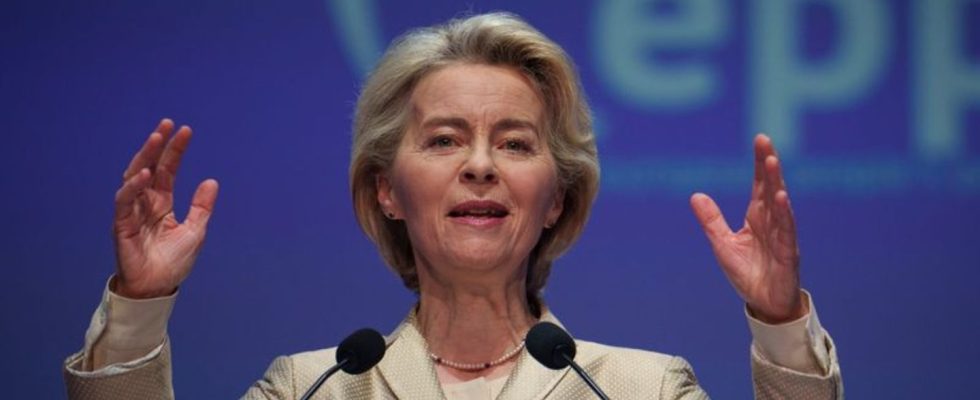President of the EU Commission
EVP elects von der Leyen as top candidate
“EPP stands for Europe, for a strong, secure, peaceful, prosperous, democratic and united Europe: Ursula von der Leyen. Photo
© Vadim Ghirda/AP/dpa
Ursula von der Leyen is officially the candidate of the European party family EPP for a second term as President of the EU Commission.
Ursula von der Leyen is officially the candidate of the European party family EPP for a second term as president EU Commission.
The CDU politician was formally installed at a congress in the Romanian capital Bucharest. 400 EPP delegates voted for von der Leyen’s top candidacy, 89 spoke against it. There were no opposing candidates.
The position of EU Commission President must be filled after the European elections in June. As a rule, a candidate from the European party family who performs best in the European elections is appointed. So far, the Christian-conservative EPP is clearly ahead in surveys. There is therefore a good chance that von der Leyen can remain in office.
Von der Leyen begins election campaign
In a speech at the congress, von der Leyen cited the fight for peace, security, freedom and prosperity as a focus of her election campaign. “The signal from Bucharest today is that the EPP stands for Europe, for a strong, secure, peaceful, prosperous, democratic and united Europe,” said the 65-year-old.
With a view to Russia’s war of aggression against Ukraine, she emphasized that the aim was to continue to help Kiev – “for as long as necessary.” Moscow “tried to sweep Ukraine away from the world.” She reiterated that the EPP supports the plan to create a new post of Defense Commissioner in the future Commission.
Merz: We shouldn’t rely on NATO alone
CDU leader Friedrich Merz warned at the EPP congress that Europe should not rely solely on NATO. It is true that “we are all deeply committed to NATO and our transatlantic partnership,” he said. “But we Europeans shouldn’t just rely on NATO. We also have to take care of ourselves, of our own defense against any aggression.”
Von der Leyen named climate and agricultural policy as another focus for the election campaign. It is still about protecting the environment but still remaining economically competitive. In view of the ongoing protests by farmers, von der Leyen emphasized that it was unacceptable that some had to sell their products below the value of the production costs.
Further at the table of the powerful?
As President of the EU Commission, von der Leyen has been in charge of around 32,000 employees since December 1, 2019, who, among other things, make proposals for new EU laws and monitor compliance with the European Treaties. The 65-year-old also sits at the table as an EU representative at almost all major international summits such as the G7 or G20. The US magazine “Forbes” recently named von der Leyen the “most powerful woman in the world”.
Before moving to Brussels, von der Leyen was, among other things, Defense Minister under then Chancellor Angela Merkel. The mother of seven children also holds a doctorate in medicine and has also served as Federal Minister for Family Affairs, Labor Minister and Social Affairs Minister in Lower Saxony.
Support from the federal government is considered certain
In addition to the German CDU and CSU, the European EVP party family includes, among others, the Austrian ÖVP, the Italian Forza Italia and Spain’s conservative People’s Party PP.
To this day, it is mainly European MPs who are skeptical about von der Leyen. One reason for this is that the German was nominated for the office by the heads of state and government in 2019, even though she was not previously the top candidate of a party family for the post. From the point of view of parliamentarians, the European Council thereby violated the so-called top candidate system, which stipulates that only the parties’ top candidates should be considered as President of the EU Commission in the European elections.
For the Christian Democrats that was the CSU politician Manfred Weber. Ultimately, however, he was unable to get a majority of the heads of state in the European Council to support his election.
It is certain that the German federal government made up of the SPD, Greens and FDP would not oppose von der Leyen if the Christian Democrats were to become the strongest political force in the EU again in the European elections in June. The reason is, among other things, that otherwise a candidate from another EU country would be considered.

